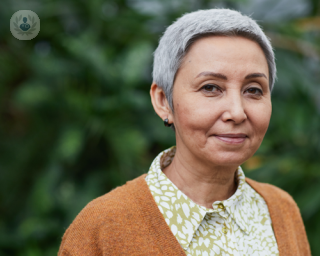Uterine cancer
Professor T. Justin Clark - Obstetrics & gynaecology
Created on: 03-11-2016
Updated on: 06-15-2023
Edited by: Karolyn Judge
What is uterine cancer?
Uterine cancer, or womb cancer, is what happens when malignant tumour cells grow in the uterus. The most common type of womb cancer affects the endometrium, the uterus’ internal lining. A less frequent form of uterine cancer is sarcoma, which affects the soft tissues in the uterus.

What is the outlook for uterine cancer?
Statistically, womb cancer mostly affects women between 50 and 70 years old. It is very rare for women under 50 to be diagnosed with the condition. Should uterine cancer be found in the early stages, when it is still limited to the uterine epithelium, survival rates range between 72 and 98 per cent. The later uterine cancer is diagnosed, the more it will have spread and the harder it will be to treat it. That’s why it is crucial to get your screening exams done periodically.
What are the symptoms for uterine cancer?
The main symptom for womb cancer (in its early stages) is abnormal vaginal bleeding, i.e. any vaginal bleeding between periods. Other symptoms may include:
- painful sexual intercourse;
- pain in the pelvic area;
- pain in the bladder area and;
- problems when passing urine.
How is uterine cancer diagnosed?
In order to make a womb cancer diagnosis, the doctor will be looking at your medical history first. Then you will have a gynaecological exam, during which you’ll usually have a transvaginal ultrasound. The transvaginal ultrasound is a scan which shows the uterine cavity through a small transducer. If it's unclear, you might have further tests, including:
- A hysteroscopy - an endoscopic exam of the uterus’ internal lining. During this exam, a sample of the lining will be taken so that it can be analysed.
- A magnetic resonance imaging (MRI) scan of the pelvic area, in order to see how far the tumour has spread.
- A computed tomography (CT) scan of the abdominal area to verify whether the tumour has spread to the lungs or not.
- A Positron Emission Tomography (PET) scan, which can show where the tumour is located and how is it evolving.
What causes womb cancer?
As of yet, it's not clear exactly what causes womb cancer. According to some studies, higher levels of oestrogen in your body, combined with lower levels of progesterone, could be one of the main reasons behind womb cancer. Statistically, it has been shown that women with this hormonal combination are more affected by womb cancer.
Other risk factors for uterine cancer, include:
- obesity;
- diabetes;
- suffering from polycystic ovarian syndrome (PCOS);
- having been or being through menopause, and;
- suffering from Lynch syndrome.
How can uterine cancer be prevented?
At the moment there are no certain steps to take to avoid uterine cancer. However, you should lead a healthy lifestyle and maintain a healthy diet. Other risk factors which may lead to developing womb cancer are smoking, a weakened immune system due to other treatments or the presence of human papilloma virus (HPV) in your body.
How can uterine cancer be treated?
Womb cancer is mainly treated with surgery. The most common type of surgery for womb cancer consists in a minimal invasive laparoscopy during which the uterus and its surroundings (Fallopian tubes, ovaries and lymph nodes) are removed.
In case of an advanced tumour, or should the doctors fear the cancer might be recurrent, after the surgery you may also get started on chemotherapy or on a therapy based on platins, taxol or anthracyclines antineoplastics.
If you can’t get started on chemotherapy, hormone therapy is an effective alternative for treating womb. In the most severe cases of recurring cancer, your doctor may advise you to undergo radiotherapy, instead of undergoing surgery.
Which doctor should I talk to about uterine cancer?
A gynaecologist is the best healthcare professional for diagnosing conditions affecting the uterus, including tumours. Treatment of uterine cancer is handled by interventional radiologists, clinical oncologists, and surgeons, depending on what type of treatment you opt for.









